Randy Alcorn's Blog
September 5, 2025
Is Being Pro-Life Really Just “Pro-Forced Birth”?

Note from Randy: Abortion involves the life of a person and therefore becomes the concern of a decent society. Just as society would protect the life of the mother if someone tried to kill her, so it should protect the life of the child if someone tries to kill her. “Forcing” a woman to continue a pregnancy, which is a natural function of her body, is not barbaric or primitive, nor is it about pro-lifers exerting control over women’s bodies, as some claim. It’s simply protecting the life of a woman’s unborn child, even if she feels her pregnancy is a burden.
And given that abortion harms women both physically and mentally, it’s protecting her, too, though she may not immediately see it as such. In time, she will likely come to understand that her temporary burden was well worth it to know that her child was rescued from death, and now has a life to live. What’s truly barbaric and primitive is unnaturally ending the life of a helpless baby in her mother’s womb, which should be the safest place for a child.
In this article, Tim Barnett with Stand to Reason answers the claim that being prolife is just “pro-forced birth.” And I hope you’ll consider downloading a free copy of my book Pro-Choice or Pro-Life?, which will equip you to have pro-life conversations with others.
Are Pro-Lifers Just “Pro-Forced Birth?”
Words matter.
They’ve been used to rally troops and comfort widows as well as incite violence and intimidate opposition. Words inspire and illuminate, but they also deceive and distort. Words are powerful.
When it comes to moral issues, the stakes are high. Words can be used to either reveal or conceal evil. Someone once said, “When words lose their meaning, people lose their lives.” This dictum is no more obvious than in the abortion debate.
Abortion advocates are brilliant at playing word games. Using clever rhetorical moves, they are able to make protecting preborn children look bad and killing preborn children look good. Here’s an example.
More and more abortion proponents are referring to their opponents as “pro-forced birth” or “forced-birth extremists.” This label is designed to deceive by focusing on two words: force and birth. First, they want you to think pro-lifers are the ones using force. After all, they claim, pro-life people are taking away pregnant women’s freedom by forcing them to carry a child. On this view, pro-choice means pro-freedom and pro-life means pro-force. Second, they want you to think pro-lifers are merely pro-birth. That is, they only care about unborn humans until they’re born. After birth, they don’t matter.
The Good Place actress Jameela Jamil employed this rhetoric in a recent Instagram post. She wrote,
Not pro-life. Pro forced birth. That’s the correct terminology for anyone who discards the life, health, mental well-being, survival and freedom of the living… for the unborn. Who they will then equally disregard the human rights of once born.
This post has over 230,000 likes. That means a lot of people are persuaded by this use of language. But it’s all smoke and mirrors. Let me show you.
Deceptive Terminology Twists Truth
First, notice how this characterizes pro-life proponents as “forcing” something (i.e. birth) on pregnant women against their will. This is not a coincidence. It’s by design. One cannot help but think of other horrific examples of forcing people to do things against their will. Forcing a woman to have sex against her will. Forcing a man to work for you against his will. Forcing a child away from her family against her will.
When abortion advocates use the words “pro-forced birth,” they want you see a parallel to “pro-forced sex” or “pro-forced slavery.” This deceptive rhetoric tries to manipulate people into calling good evil and evil good. Unfortunately, it seems to be working.
In reality, pro-lifers aren’t forcing women to do something. Rather, they are telling them not to do something (i.e., do not kill another human being). This might be better described as restraining evil by threat of punishment.
We do this all the time, by the way. What pro-lifers are advocating here is nothing more than what ordinary people advocate when they restrict behavior that endangers the lives of other humans. For example, nobody seriously complains about being restricted to 25 miles per hour in a school zone with kids all around. People don’t protest because this restriction protects the lives of innocent children.
Calling someone “pro-forced birth” is a lot like calling someone “pro-forced speed limit in a school zone.” Both want to restrict acts that bring harm to innocent humans—whether unborn or born.
So, first, abortion advocates use the language of “force” to twist truth. This rhetoric makes it sound like pro-lifers are the ones doing something wrong—forcibly causing some wicked act against pregnant women. The truth is just the opposite. They are trying to prevent a wicked act—the forced killing of an innocent human being. This leads to my next point.
Who’s Really Forcing?
Second, abortion is the “force” option—literally, pro-forced death. Let me explain.
“Pro-forced birth” is an inappropriate way to describe pro-lifers—those trying to prevent the killing of unborn human beings. But it’s also a strange way of characterizing birth. After all, birth is a natural consequence of a natural process. The result of an uninterrupted, healthy pregnancy is childbirth. No external force necessary.
Abortion, on the other hand, is the use of deadly force—an unnatural intrusion of lethal force against an innocent human being into the very space perfectly designed for the baby’s safe, natural development. Forcing a flood of poisonous fluid into a woman’s uterus to chemically burn a baby to death. Forcing a sharp scalpel into the brain of an innocent child and dismembering her in utero, then forcing forceps to remove her body parts piece by piece.
Every elective abortion uses deadly force to kill a human being. Every successful abortion ends with a dead human. Thus, abortion is pro-forced death. And that’s not rhetoric. That’s fact.
Isn’t it interesting, then, how proponents of the “pro-forced death” position try to saddle pro-lifers with the manipulative language of “force”?
However, once we pull back the veil on the rhetorical game that’s being played, we can clearly see what’s really going on.
Merely “Pro-Birth”?
One more thing. Some lies are repeated so often, people uncritically accept them as true.
Abortion advocates often describe pro-lifers as only caring about humans before birth but not after. This is demonstrably false. Pro-life people around the world are actively involved in efforts to help the sick, feed the hungry, clothe the naked, build orphanages, fight sex trafficking, and all kinds of other humanitarian work.
And, for the record, there are more nonprofit, pro-life crisis pregnancy centers in this country—funded by the generous financial gifts and unpaid volunteer help of pro-lifers—than there are for-profit, abortion centers—funded by fees gathered from killing unborn humans and from tax dollars.
So, pro-lifers aren’t “pro-force,” and they aren’t merely “pro-birth.” And they certainly aren’t “pro-forced birth.” This is a deceptive language.
When it comes to moral issues, like abortion, we must always be alert for the word games, rhetorical ploys, and manipulative language that distort the truth and make something evil look good.
Originally published at Stand to Reason. Reprinted with permission.
Recommended Reading
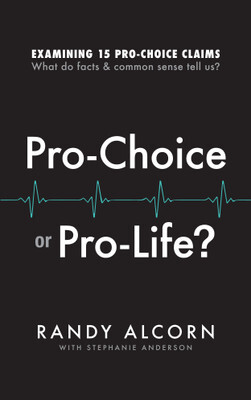 Pro-Choice or Pro-Life?
Pro-Choice or Pro-Life? 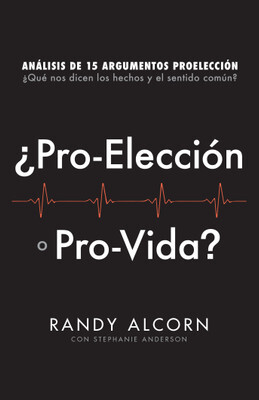 ¿Proelección o Provida? (Pro-Choice or Pro-Life? in Spanish)
¿Proelección o Provida? (Pro-Choice or Pro-Life? in Spanish)
September 3, 2025
That Time J. I. Packer Read from the Heaven Book

Almost five years ago, J. I. Packer, one of my favorite writers and favorite people, went to be with Jesus. There are many people I respect, but not many I’m in awe of. Dr. Packer is one of them. My life first as a child of God, and then as a pastor and writer, has been deeply affected by him.
When his book Knowing God came out in 1973, I was a young Christian. God used it in my life profoundly. It is still one of my top five books of all time. If you haven’t read it, order it now and get ready for a treat, and then read anything and everything by J. I. Packer. I have benefited greatly from Evangelism and the Sovereignty of God, and years later God spoke to me through Keep in Step with the Spirit. My love for the Puritans deepened when reading A Quest for Godliness. I have profited too from his Shorter Writings and in speaking against the health and wealth gospel I have quoted from his unlikely named Hot Tub Religion. But start with Knowing God. (You can read chapter one here.)
Back in 2009, I was asked to be on a panel on Heaven and Hell at a book conference. When I asked who else would be on the panel, they mentioned J. I. Packer, and my response was, “I will do it as long as I can sit next to Dr. Packer.” (The organizers kindly accommodated my request!)
Thirty-six years after reading Knowing God as a teenager, it was surreal to be chatting and drinking Starbucks and hanging out with Dr. Packer before the panel started. In fact, as we talked, J. I. mentioned that he hadn’t had time to get coffee with his breakfast. Nanci quickly and cheerfully offered to get him a drink from Starbucks. With a twinkle in her eye, she told me later, “I got coffee for J. I. Packer!”
That time with him was great, but what really left me speechless was that during the panel discussion, J. I. reached in his briefcase and pulled out my big Heaven book and read from it! And not because he disagreed, which was initially the only reason I could think of for him referring to it.
J. I. Packer pulling out my Heaven book was REALLY too much. Then when he made a nice comment about my book, I dropped my face into my hands, and people started laughing. Later, looking over his shoulder, I could see the book was worn and he had marked it up. Knowing Dr. Packer had written about the great Puritan Richard Baxter, I was amazed and touched that he said my book was for the current time what Richard Baxter’s The Saints Everlasting Rest was in the seventeenth century. This was typical of his kindness and graciousness that encouraged so many of us.
At one point later in the panel discussion Dr. Packer answered a question, then leaned over and looked at me sincerely, whispering, “Do you think that was right?”
What I thought was, “You are J. I. Packer. I am an idiot.” What I said, nodding my head too emphatically, was “Yes.”
Here's the clip of J. I. reading that Richard Baxter quote:
https://www.youtube.com/watch?v=1GJIcDmk-Rs?si=4H9nSJT1n683lp7G
This is the text of the Baxter quote he read:
If there be so certain and glorious a rest for the saints, why is there no more industrious seeking after it? One would think, if a man did but once hear of such unspeakable glory to be obtained, and believed what he heard to be true, he should be transported with the vehemency of his desire after it, and should almost forget to eat and drink, and should care for nothing else, and speak of and inquire after nothing else, but how to get this treasure. And yet people who hear of it daily, and profess to believe it as a fundamental article of their faith, do as little mind it, or labour for it, as if they had never heard of any such thing, or did not believe one word they hear.
Recommended Reading
 50 Days of Heaven (Special Edition)
50 Days of Heaven (Special Edition) 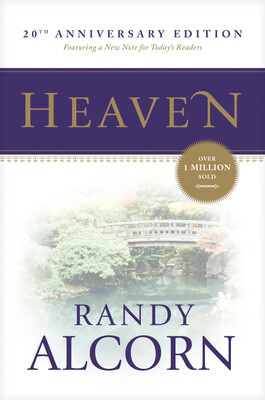 Heaven
Heaven 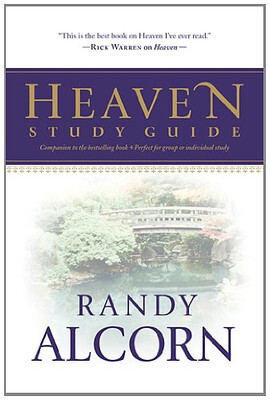 Heaven Study Guide
Heaven Study Guide
September 1, 2025
These Seven Biblical Truths Can Bring You Great Happiness

In my last blog, I shared six false expectations that can diminish our happiness. So what truths should raise our expectations of happiness? Here are seven worth focusing on:
1. God’s Immeasurable Love for Us
In Ephesians, Paul prays that the recipients of his letter may “have strength to comprehend with all the saints what is the breadth and length and height and depth, and to know the love of Christ that surpasses knowledge, that you may be filled with all the fullness of God” (Ephesians 3:18-19).
He ends the chapter saying, “To him who is able to do far more abundantly than all that we ask or think, according to the power at work within us, to him be glory in the church and in Christ Jesus throughout all generations, forever and ever” (Ephesians 3:20-21).
After reading this inspired text, how great should our expectations of God be?
2. God’s Willingness to Completely Forgive Us Whenever We Confess Our Sins
Ironically, it’s easier to be restored to a positive relationship with God than with any other being. As difficult as this is to grasp, when we do, it’s happy-making in the extreme.
God is the holiest being in the universe, meaning that His standards are infinitely higher than any creature’s. It would be easy to conclude, then, that God would be more prone than anyone else to hold our offenses against us. Yet the opposite is true. “If we confess our sins, he is faithful and just to forgive us our sins and to cleanse us from all unrighteousness” (1 John 1:9). Who else will forgive us of everything, absolutely and every time—even when we’ve deeply hurt them?
It’s not the sinless God but sinful people who sometimes refuse to forgive us—just as we are sometimes slow to forgive.
Nothing we’ve done or can ever do will surprise God or cause Him to change His mind about us. No skeletons will fall out of our closets in eternity. He has seen us at our worst and still loves us. Arms wide open, He invites our confession and repentance, which He always meets with His grace and forgiveness.
How secure are we in God’s love? Jesus said, “My sheep hear my voice, and I know them, and they follow me. I give them eternal life, and they will never perish, and no one will snatch them out of my hand” (John 10:27-28).
3. God’s Constant Presence in Us and with Us
Matthew Henry said, “Happy are those who have the Lord for their God, for they have a God that they cannot be robbed of. Enemies may steal our goods, but not our God.”
Joshua 1:9 offers this encouragement: “The Lord your God is with you wherever you go.” Jesus promised His disciples, “I am with you always” (Matthew 28:20). Here is a source of both comfort and courage: “Fear not, for I am with you; be not dismayed, for I am your God; I will strengthen you, I will help you, I will uphold you with my righteous right hand” (Isaiah 41:10).
Our happiness is largely determined by who or what we depend on. If we depend on God, we’ll be happy because God is always with us: “God’s Spirit dwells in you” (1 Corinthians 3:16). Of course, sometimes we’ll sense His presence more than other times. But He is there for us when life is dry, stressful, or traumatic, helping us and even praying for us: “The Spirit helps us in our weakness. . . . The Spirit himself intercedes for us with groanings too deep for words” (Romans 8:26).
The stories of many prisoners—including Corrie ten Boom, Richard Wurmbrand, and Aleksandr Solzhenitsyn—document that they survived imprisonment and torture because God’s supernatural indwelling presence was their lifeline. We who know Jesus have the same.
“God has said, ‘Never will I leave you; never will I forsake you’” (Hebrews 13:5, NIV). Such a promise offers us happiness in the most difficult times and places.
4. The Transforming Power of God’s Word
Never underestimate the life-changing nature of God’s inspired Word: “All Scripture is inspired by God and is useful to teach us what is true and to make us realize what is wrong in our lives. It corrects us when we are wrong and teaches us to do what is right. God uses it to prepare and equip his people to do every good work” (2 Timothy 3:16-17, NLT). Meditating on Scripture, which God uses to make us more like Christ, is a powerful source of personal happiness.
God promises that His Word “will not return to me empty, but will accomplish what I desire and achieve the purpose for which I sent it” (Isaiah 55:11). He does not promise that about OUR words, but HIS. If we want our words to have lasting value and impact, they need to be touched and shaped by His words—and that won’t happen without a daily choice to expose our minds to Scripture.
5. The Sufficiency of Christ’s Work on Our Behalf
When Jesus said “it is finished” John 19:30), he used the Greek word teleo, which was commonly written over certificates of debt once they were fully paid. It means “nothing more is owed; there is no more debt to be paid.” It’s not that Christ took on 99% of our sin and guilt and we must carry the other 1%. It’s that He took it all on.
Consider this promise: “[God’s] divine power has granted to us all things that pertain to life and godliness” (2 Peter 1:3). We’re also told that God has “blessed us in Christ with every spiritual blessing in the heavenly places” (Ephesians 1:3). We can rejoice knowing that Christ has already provided all we need for salvation and eternal happiness.
6. The Providence of God and His Sovereign Purpose in Our Lives
We can be confident knowing that God is in control of the details of our lives: “Yours, O Lord, is the greatness and the power and the glory and the victory and the majesty, for all that is in the heavens and in the earth is yours. Yours is the kingdom, O Lord, and you are exalted as head above all. Both riches and honor come from you, and you rule over all. In your hand are power and might, and in your hand it is to make great and to give strength to all” (1 Chronicles 29:11-12).
God pays a great deal of attention to the “little things.” He numbers the hairs on our heads and cares for the lilies of the field. Jesus said, “Are not two sparrows sold for a penny? And not one of them will fall to the ground apart from your Father. But even the hairs of your head are all numbered. Fear not, therefore; you are of more value than many sparrows” (Matthew 10:29-31).
Our fates do not rest in the hands of fallen humankind: politicians, lawyers, military officers, employers, or even spouses and children. No matter what happens, and how much it hurts, God is fully capable of using painful events for good.
7. The Undiluted and Eternal Happiness That Awaits Us
“You have endowed him with eternal blessings and given him the joy of your presence” (Psalm 21:6, NLT). “And the ransomed of the LORD shall return and come to Zion with singing; everlasting joy shall be upon their heads; they shall obtain gladness and joy, and sorrow and sighing shall flee away” (Isaiah 51:11).
Jonathan Edwards wrote, “After they have had the pleasure of beholding the face of God millions of ages, it will not grow a dull story; the relish of this delight will be as exquisite as ever.”
Undiminished happiness is promised us—what other king has ever promised his people anything so great? And what other king has undergone for his subjects the ultimate sacrifice to fulfill that promise?
Recommended Reading
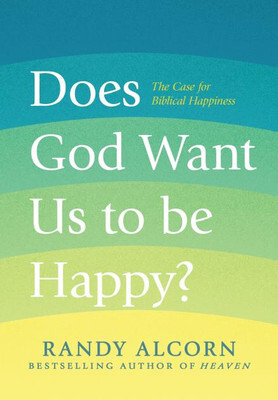 Does God Want Us to Be Happy?
Does God Want Us to Be Happy?  God's Promise of Happiness
God's Promise of Happiness  Happiness (softcover)
Happiness (softcover)
August 29, 2025
Are Any of These Six False Expectations Diminishing Your Happiness?

Most people intuitively know that our expectations profoundly affect our life experiences. Yet even as believers, we simultaneously expect too much and too little. We need to discover what we should expect less of and what merits higher expectations. That involves lowering our expectations concerning all the advantages we think life should bring us while raising our expectations concerning Christ and what He is daily accomplishing in us.
Here are six false expectations—those that are not grounded in Scripture and undermine our happiness:
1. God’s Love for Us Should Look Just Like What We Want
God has promised us His undying love, but we often imagine how we’d do things differently for those we loved if we were all powerful. We’d surely keep anything bad from ever happening to them, right? That may be our understanding of love, but it’s not God’s.
If we ignore countless passages that promise us persecution and suffering while focusing on those that promise us God’s blessing, we lose sight of His promise to discipline us, build our character, and increase our Christlikeness through suffering.
We ought to expect with the highest confidence only what God has clearly, fundamentally, and absolutely promised. And if our gratitude is lessened with such an understanding, the problem is our expectations, not God’s promises. If we expect God to make our lives easy, our expectations are unbiblical.
2. We Won’t Be Persecuted for Our Faith
Jesus said, “If the world hates you, keep in mind that it hated me first” (John 15:18, NIV). Peter said we should be firm in our faith, “knowing that the same kinds of suffering are being experienced by your brotherhood throughout the world” (1 Peter 5:9).
In spite of multiple promises of suffering throughout Scripture, many Christians seem shocked or outraged when they have to face these trials. Americans have been slow to accept the extent to which Bible-believing Christ-followers have become socially unacceptable. Though we should work to hold on to our religious liberties, it’s likely they’ll continue to erode. But cheer up! Opposition is nothing new for God’s people, and historically the church’s greatest advances have come at the lowest ebb of its popularity.
The Christian faith may never return to its central public role in our culture, but Christ’s gospel is bigger than every obstacle. Sometimes a less popular church becomes a more faithful, dynamic, and joyful church. Any church whose happiness hinges on its popularity will either compromise its integrity or surrender its happiness—in either case failing to show the world the true and joyful gospel of Jesus.
3. Jesus Must Return in Our Lifetime
“Stay awake, for you do not know on what day your Lord is coming. . . . Be ready, for the Son of Man is coming at an hour you do not expect” (Matthew 24:42, 44).
Christ will surely return, just as He promised (see Luke 21:27). Since the beginning of church history, many believers have thought Christ would return in their lifetimes. So far, everyone who has died in the past two thousand years has been wrong in that expectation.
In recent years, I’ve often heard believers say, “Christ has to return within the next few years.” No, He doesn’t. He may, but He may not return for decades or centuries. That’s entirely up to Him. Meanwhile, it’s up to us to continue living for Him.
4. Life Will Go Smoothly and We’ll Always Have Health and Wealth
Scott Peck opens The Road Less Traveled, “Life is difficult. . . . Once we truly know that life is difficult—once we truly understand and accept it—then life is no longer difficult.” Well, it’s less difficult, anyway!
Paul said, “We brought nothing into the world, and we cannot take anything out of the world. But if we have food and clothing, with these we will be content” (1 Timothy 6:7-8). Food and clothing may seem like low expectations. By the standards of the health-and-wealth gospel, these expectations are dismally low, but they’re accompanied by dramatically high expectations of God, who gives us riches in Heaven. After all, He’s the source of our joy!
Has God promised to make us healthy and wealthy? No, not in this life—only in the resurrected life on the New Earth.
5. Life Will Be Fair and People Will Treat Us Kindly and Thoughtfully
Jesus said, “If you lend to those from whom you expect to receive, what credit is that to you? . . . But love your enemies, and do good, and lend, expecting nothing in return, and your reward will be great” (Luke 6:34-35).
All Bible passages about forgiveness involve lowering our expectations of people and not insisting they live up to our standards, or demanding perfection we don’t measure up to ourselves. God’s grace should calm us and cheer us.
If my saying, “Cheer up” seems naive, someone else—Jesus—said it first: “I have told you this, so that you might have peace in your hearts because of me. While you are in the world, you will have to suffer. But cheer up! I have defeated the world” (John 16:33, CEV).
6. Churches Owe Us Better Treatment than We’ve Received
I am sadly aware that churches have contributed to much unhappiness. But when our expectations of church people, and especially pastors, are inordinately high, we become deeply disappointed, thinking that Christians should know better and have no business being imperfect (often not realizing how imperfect we ourselves are and that the problem with church people is often that they are too much like us).
Scripture tells us we shouldn’t be “neglecting to meet together, as is the habit of some,” but should gather together, “encouraging one another” (Hebrews 10:25). When we back away from the local church, we often engage in spiritual isolation that’s likely to not only distance us from God’s work but also sour us and our children to the great good churches are doing.
We need to fix our eyes on Jesus, raise our expectations of our personal need to obey Him by being part of and serving the church, and lower our expectations of others so we’ll be more understanding and forgiving. Sometimes we need to find another church that teaches God’s Word and centers on Jesus. He sees all the flaws in the church, but He hasn’t given up on His bride, and He won’t (see Matthew 16:18). Neither should we.
Recommended Reading
 God's Promise of Happiness
God's Promise of Happiness  Happiness (softcover)
Happiness (softcover) 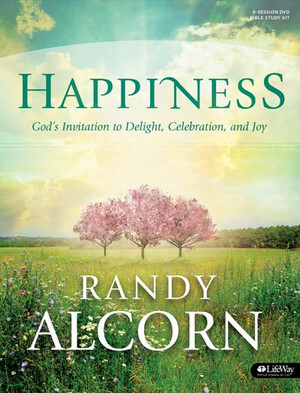 Happiness Leader Kit
Happiness Leader Kit
August 27, 2025
Will Our Earthly Marriage Partners Still Be Important to Us in Heaven?

One of the most frequent questions I’ve been asked about Heaven is about the nature of marriage there. As I share in my book Heaven, there will be one marriage in Heaven, not many. That marriage will be what earthly marriage symbolized and pointed to, the marriage of Christ to His bride. So we will all be married—but to Christ.
Our marriage to Him is the true Marriage, of which the best of earthly marriages was a symbol and shadow. Those who did not experience marriage or had only a poor marriage on earth will be delighted with their eternal Bridegroom, who has already gone to prepare a place for them. One day all Heaven will attend the ultimate wedding, and we will be His bride (see Revelation 19:7-9).
However, I do envision that people who’ve had important roles in each other’s lives will continue to be friends—and that would include a lot of people who’ve been married. Although married couples’ relationships will look different in Heaven, that certainly doesn’t mean that earthly marriage is unimportant. God uses it in our lives in profound ways!
Jesus said the institution of human marriage would end, having fulfilled its purpose. But He never hinted that deep relationships between married people would end.
Here on Earth we long for a perfect marriage. That’s exactly what we’ll have—a perfect marriage with Christ. Nanci is not only my wife, but also my best friend and my closest sister in Christ. Will we become more distant in the new world? Of course not—we’ll become closer, I’m convinced. The God who said, “It is not good for the man to be alone” (Genesis 2:18) is the giver and blesser of our relationships.
Life on this earth matters. What we do here touches strings that reverberate for all eternity. Nothing will take away from the fact that Nanci and I were marriage partners here and that we invested so much of our lives in each other, serving Christ together.
In their book The Meaning of Marriage, Tim and Kathy Keller write:
What, then, is marriage for? It is for helping each other to become our future glory-selves, the new creations that God will eventually make us. The common horizon husband and wife look toward is the Throne, and the holy, spotless, and blameless nature we will have. I can think of no more powerful common horizon than that, and that is why putting a Christian friendship at the heart of a marriage relationship can lift it to a level that no other vision for marriage approaches.
Have you ever traveled to a mountainous part of the world when it was cloudy and rainy? You look out your windows and you can see almost nothing but the ground. Then the rain stops and the clouds part and you catch your breath because there, towering right over you, is this magnificent peak. But a couple of hours later the clouds roll in and it has vanished, and you don’t see it again for a good while. That is what it is like to get to know a Christian. You have an old self and a new self (Ephesians 4:24). The old self is crippled with anxieties, the need to prove yourself, bad habits you can’t break, and many besetting sins and entrenched character flaws. The new self is still you, but you are liberated from your sins and flaws. This new self is always a work in process, and sometimes the clouds of the old self make it almost completely invisible. But sometimes the clouds really part, and you see the wisdom, courage, and love of which you are capable. It is a glimpse of where you are going.
Within this Christian vision for marriage, here’s what it means to fall in love. It is to look at another person and get a glimpse of the person God is creating, and to say, “I see who God is making you, and it excites me! I want to be part of that. I want to partner with you and God in the journey you are taking to his throne. And when we get there, I will look at your magnificence and say, ‘I always knew you could be like this. I got glimpses of it on earth, but now look at you!’”
Each spouse should see the great thing that Jesus is doing in the life of their mate through the Word, the gospel. Each spouse then should give him- or herself to be a vehicle for that work and envision the day that you will stand together before God, seeing each other presented in spotless beauty and glory.
There is continuity from this life to the next. Married people have shared experiences here on the present Earth, and I think we’ll look back on those times like we were soldiers in the trenches together: we had great times and we had hard times. We should expect those relationships with family to be special and continue forever.
I fully anticipate that no one besides God will understand me better on the New Earth than Nanci, and other than Jesus, I believe, there’s nobody whose company I’ll seek and enjoy more than Nanci’s. I can’t wait to see Nanci again and have her show me around Heaven, and then after the resurrection when we relocate to the New Earth, for us to both experience it for the first time together. How glorious that will be, and above all just to be with Jesus regardless of where!
The joys of marriage in eternity will be far greater because of the character and love of our Bridegroom. I rejoice for Nanci and for me that we’ll both be married to the most wonderful person in the universe. He’s already the one we love most—there is no competition. On Earth, the closer we draw to Him, the closer we draw to each other. Surely the same will be true in Heaven.
What an honor it will be to always know that God chose us for each other on this old Earth so that we might have a foretaste of life with Him on the New Earth.
Recommended Reading
 50 Days of Heaven (Special Edition)
50 Days of Heaven (Special Edition)  Grieving with Hope
Grieving with Hope  Heaven
Heaven
August 20, 2025
What You Do for the Glory of Jesus Will Last Forever: Answering Questions about Eternal Rewards

I shared in my last blog that I had a wonderful time attending the Kingdom Advisors conference earlier this year, along with my grandson Jake. If you haven’t yet watched my interview with Ron Blue, I encourage you to do so. I think you’ll especially enjoy hearing what Ron has to share.
I also had the opportunity to do a breakout session focused on eternal rewards, which is the subject of my book The Law of Rewards. Eternal rewards can be a controversial topic in the evangelical community, partly because some people think it is anti-grace and leads to works-righteousness to earn salvation. Nothing could be further from the truth, but that’s the perception. I emphatically agree that eternal life is entirely “the gift of God” (Romans 6:23). In going to Heaven, we don’t get what we deserve. What we all deserve is hell. Heaven is a gift, not a reward.
Yet we have developed an anti-works mentality, which is unfortunate since immediately after saying we are not saved by our works, God tells us “we are His workmanship created in Christ Jesus to do good works” (Ephesians 2:8-10). So why are we here on this earth? To do good works.
That’s why I was glad to do a session on this topic. After I shared a short message about eternal rewards, the audience asked some great questions, including these. You can click on an individual question to listen, or listen to the entire message and Q&A below:
What Have Been the Largest Threats to Your Generosity Journey?
What’s the Most Urgent Message Financial Advisors Should Share with Their Clients Today?
How Can Setting a Finish Line Help Us Live Generous Lives?
What Is the October Story, and How Can It Help Us Live Wisely and Generously?
Will There Be Animals and Even Our Pets on the New Earth?
What Have Most Bible-Believing Christians Missed About the New Heaven and the New Earth?
How Do You Deal with the Temptation of Selfishness in Seeking Eternal Rewards?
How Is the Word “Inheritance” Used in Proverbs 13:22?
Here’s the full audio.
Recommended Reading
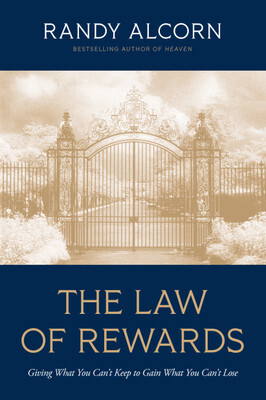 The Law of Rewards (Softcover)
The Law of Rewards (Softcover) 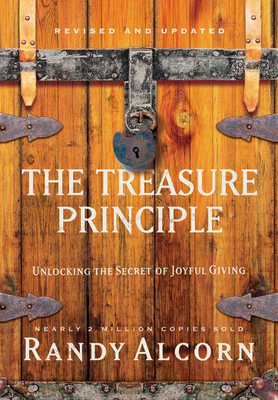 The Treasure Principle: Revised and Updated
The Treasure Principle: Revised and Updated
August 18, 2025
Ron Blue and I Share about Generosity, and What Louie Giglio Said That Made Me Laugh

In February, I attended the Kingdom Advisors annual conference, which gathered 2,500 Christian financial professionals who influence their clients to give generously to God’s kingdom. What joy to talk, worship, and be with those who love Jesus and desire to steward resources well, to His glory! And it was especially fun for me because my grandson Jake, who’s planning to be a financial counselor, also attended so he could take part in the college program at the conference.
The picture above is of Ron Blue, the founder of Kingdom Advisors, and I being interviewed by Sharon Epps, who’s their president. Ron’s wise, and he has a heart for what stirs God’s heart. (Check out his books Master Your Money: A Step-by-Step Plan for Experiencing Financial Contentment and Splitting Heirs: Giving Your Money and Things to Your Children Without Ruining Their Lives.) I know Ron to be a man who loves Jesus and desires to serve people. I love that brother. We have a lot of fun together!
Here’s the video of us being interviewed. What a privilege to be up there with Ron after forty-five years of serving in different but complementary areas of stewardship and generosity:
https://www.youtube.com/watch?v=Rh2ToZ29HOE
I’ll share another Q&A I did at the conference in a future blog. But I’ll end for now with something fun that happened. One of the keynote speakers was Louie Giglio, whose message followed the interview with Ron and me.
The times I’ve talked in person with Louie have been rich. In those conversations I’ve seen his depth of love for Christ, for the gospel, and for the welfare of others. (He’s also a huge celebrity among college kids because of the Passion Conference, so my grandson Jake was excited to hear him speak!)
For the second time in the last few years, Louie has spoken on Heaven when I have been present speaking on something else, and in both cases, he has been a bit self-conscious about that, making side comments down at me like, “I hope that's right, Randy.” 😂 I got a kick out of the intro to Louie’s message. You’ll see what I’m talking about in this two-minute clip:
https://www.youtube.com/watch?v=0ghl7Ag5U8o
Recommended Reading
 The Law of Rewards (Softcover)
The Law of Rewards (Softcover) 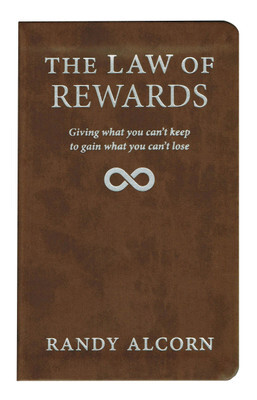 The Law of Rewards (Special Edition)
The Law of Rewards (Special Edition)  The Treasure Principle: Revised and Updated
The Treasure Principle: Revised and Updated
August 15, 2025
God Is Doing Far More Miracles Than We Realize—Every Day in Human Hearts

When God drew me to faith in Christ, as a 15-year-old, my life changed radically. One of the hundreds of verses I memorized was this one: “Therefore, if anyone is in Christ, he is a new creation. The old has passed away; behold, the new has come” (2 Corinthians 5:17). The only explanation of this was nothing less than miraculous. As the next verse says, “All this is from God, who through Christ reconciled us to himself…” (v. 18).
Miracles are things which God does that cannot be explained by natural processes or human actions. Hence every true conversion—which is not the same as every outward profession—is by definition a miracle. It may seem that, compared to what we see in Scripture, visible miracles are very few and far between today. But greater invisible miracles are in fact are happening all the time around us as God regenerates hard human hearts. Hence, God is doing far more miracles than we realize.
The Costly Miracle of a New Heart
Our Lord transforming human hearts, through stunning acts done daily around the globe, is every bit as miraculous as Jesus transforming water into wine. In fact, these redemptive acts make the dividing of the Red Sea, the falling walls of Jericho, and the raising of Lazarus from the dead actually pale in comparison. Is that an overstatement? No, because the greatest physical miracles cost our all-powerful God nothing, but the miracles of salvation, sanctification, and glorification cost the very life of God’s Son.
God gives us a new heart (Ezekiel 36:26), makes us new in Christ (Ephesians 4:24), and changes our destiny from death to life, from Hell to Heaven (John 5:24). He takes drug-addicts, sex-addicts, pride-addicts, gossip-addicts, and every variety of sin-addict and works a transforming miracle in us.
As we yield our wills to Him daily, He provides yet another series of sanctifying miracles for us, so that cumulatively, if we have eyes to see, we’ll realize there have been thousands of intervening miracles of grace in just our own lives, and countless millions upon millions more in the lives of others. (For more on this, see The Wonderful Miracle of Conversion.)
God’s Miraculous, Empowering Grace
Often when someone dies, the loved ones say, “We prayed for a miracle, but for some reason God chose not to answer.” I understand this, and indeed it’s true that God sometimes doesn’t perform the miracle we asked for.
When that’s the case, I think we would do well to realize this: “While He didn’t perform the miracle we asked for, He performed many other miracles of grace and encouragement, inspiration and comfort, personal transformation and increased dependence on Jesus, worship and deepened relationships, faithfulness and perseverance, empowerment, and open doors of evangelism…and almost certainly many other miracles we don’t yet know of but one day will. And some—perhaps many—of those miracles happened because the miracle we prayed for didn’t.” (See “If I Have Enough Faith, Will God Heal Me?”)
I witnessed miracles in Nanci’s life and mine as we prayed for the miracle of God directly intervening to cure her colon cancer. God chose not to heal her this side of Heaven, but I can vouch firsthand for the miracle of God’s empowering grace in our lives. As Nanci daily meditated on Scripture and read Tozer’s Knowledge of the Holy and The Pursuit of God, and Packer’s Knowing God, and as we discussed what we were learning and prayed together, I saw in her and in me a profound “peace of God, which surpasses all understanding” that “will guard your hearts and your minds in Christ Jesus” (Philippians 4:7).
My point is that we don’t lack miracles in our lives! What we lack is the vision, the eternal perspective, that allows us to see and experience and marvel at these miracles. For while we may say redemptive transformation is an invisible miracle, that’s not entirely true since its effects are visible. Jesus said, “Every tree is known by its own fruit” (Luke 6:44).
Consider 2 Corinthians 3:18: “And we all, with unveiled face, beholding the glory of the Lord, are being transformed into the same image from one degree of glory to another. For this comes from the Lord who is the Spirit.” Isn’t this “invisible miracle,” which is really an ongoing daily series of miracles, ultimately visible? Doesn’t it result in a life once characterized by the sordid works of the flesh (Galatians 5:19-21) becoming a new life that bears the fruit—and fruit is visible—of the indwelling Holy Spirit? “But the fruit of the Spirit is love, joy, peace, forbearance, kindness, goodness, faithfulness, gentleness and self-control” (Galatians 5:22-23).
Can you think of a greater miracle, or ongoing series of thousands of miracles, in each redeemed life? So, thank God daily for His miracles of grace in your life and those you know, and a world full of people you don’t know but one day will live with in the presence of Jesus. And ask Him to open your eyes to His miracles, not limiting them to physical or medical miracles.
Forgiveness Is the Greatest Miracle
Every time Jesus forgives sin, He performs the greatest of miracles. In Mark 2:1-12 Jesus performed an amazing miracle, the healing of the paralytic. But there’s much to be learned from this passage, because the first thing Jesus did was to say to the paralyzed man, “Son, your sins are forgiven” (v. 5).
Then the teachers were offended because they thought, “Why does this fellow talk like that? He’s blaspheming! Who can forgive sins but God alone?” (v. 7).
Jesus then asked them, “Which is easier: to say to this paralyzed man, ‘Your sins are forgiven,’ or to say, ‘Get up, take your mat and walk’?” (v. 9).
The answer is obvious. It is easier to say sins are forgiven, because there’s no way to prove that has actually happened. But if you say “Get up” to someone who’s paralyzed, a miracle won’t have occurred unless he actually gets up! So everyone will either see the miracle or know that it hasn’t happened.
Then Jesus said, “But I want you to know that the Son of Man has authority on earth to forgive sins.” So He said to the man, “I tell you, get up, take your mat and go home” (v. 10-11). Then the man got up and “walked out in full view of them all. This amazed everyone and they praised God, saying, ‘We have never seen anything like this!’” (v. 12).
Though the people were amazed at the physical healing, many may have missed the point that the greater miracle was Jesus forgiving the man’s sins! It was to authenticate the greater miracle of forgiveness that Jesus performed the lesser miracle of physical healing.
Why do I call it a lesser miracle? For several reasons, but it takes me back to the fact that the omnipotent God can heal physical problems with no effort or cost. But He could not heal spiritual problems nor forgive sins without going to the cross to die for us, which was neither easy nor costless even for the omnipotent Creator. (How could Jesus say “Your sins are forgiven” to someone before the cross? This article provides a helpful answer.)
As for some other answers to the question of why God doesn’t seem to do as many physical miracles today, do listen to this excellent 10-minute answer from John Piper.
Recommended Reading
 Deadline
Deadline  Lord Foulgrin's Letters
Lord Foulgrin's Letters 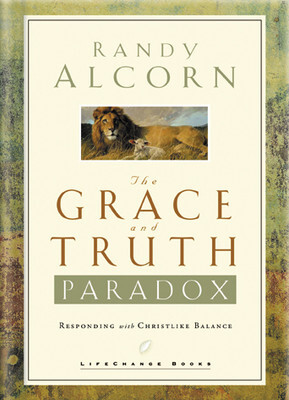 The Grace and Truth Paradox
The Grace and Truth Paradox
August 13, 2025
How Can We Avoid “Believing” the Bible While Denying What It Actually Says?

Psalm 1 reminds us just how important delighting and meditating on God’s Word is. Here’s how the CSB renders it (note the use of “happy” in verse one for the Hebrew asher, often translated “blessed”):
1 How happy is the one who does not
walk in the advice of the wicked
or stand in the pathway with sinners
or sit in the company of mockers!
2 Instead, his delight is in the Lord’s instruction,
and he meditates on it day and night.
3 He is like a tree planted beside flowing streams
that bears its fruit in its season
and whose leaf does not wither.
Whatever he does prospers.
4 The wicked are not like this;
instead, they are like chaff that the wind blows away.
5 Therefore the wicked will not stand up in the judgment,
nor sinners in the assembly of the righteous.
6 For the Lord watches over the way of the righteous,
but the way of the wicked leads to ruin.
In order to delight and meditate on the law of the Lord, we must understand correctly what Scripture actually says. Sometimes I’m struck by how many Christians say they believe the Bible, but their interpretations are so out of line with credible biblical meanings that their profession of confidence in Scripture becomes meaningless, and even dangerous. Not only is this happening more frequently today, it’s also being accepted as normal.
Historically, theological liberals denied Scripture, and everyone knew where they stood. But today many so-called evangelicals affirm their belief in Scripture, while attributing meanings to biblical texts that in fact deny what Scripture really says. Hence they “believe every word of the Bible” while actually embracing (and teaching) beliefs that utterly contradict it.
I’m not talking about mere differences within the sphere of orthodoxy, such as the debates between Calvinists and Arminians, or various interpretations for some of the most difficult problem passages or intramural squabbles about spiritual gifts or ordinances or church polity. I’m talking about people believing and confidently affirming that Scripture says what no one in the history of the church ever believed it says—or some people did say it but were easily recognized as heretics. (Universalism is just one example among many, though an important one.)
We rightly call upon people to read their Bibles, but it seems many spend much more time reading into the Bible than reading out of it. So nearly everything they read becomes a mere echo of what they already think or what most people around them are already saying. God gave us His Word to teach, rebuke, correct, and train our thinking (2 Timothy 3:16), not so we could interpret it away into a mirror image of our preferred beliefs.
You can believe in the inspiration and even inerrancy of God’s Word, but because your subjective interpretation doesn’t center on the author’s (and Author’s) intention, but on what seems right to you and the secular or church culture, the Bible isn’t really your authority. You don’t let it correct your thinking but walk away with an interpretation which conveniently supports your comfortable beliefs.
If you’ve never watched John Piper’s Look at the Book series, I highly encourage you to do so. In one of the early sessions in Finding Meaning in the Bible, he talks about The Golden Rule of Bible Reading. Just as we would like people to understand what we actually mean by our words, so we need to find the intended meaning of the biblical authors, not superimpose on Scripture our own preferred meanings.
This reminds me of the challenge small group Bible studies face where the main question can easily become “What does this passage mean to you?” instead of “What did it mean to the author and original readers?” Only when we ask that second question can we then figure out how to properly apply God’s Word to our own lives. (Of course there are numbers of passages where we can’t be 100% certain of the meaning. But overall, there is much clarity of meaning in Scripture. Otherwise, reading the Bible would be meaningless because the Holy Spirit could never change or transform us through words we can’t know the meaning of, or to which we can feel free to ascribe any meaning we wish.)
We need to learn, and teach other people, not just to read the Bible but also how to interpret it, so they don’t end up being Bible-believing heretics or Jesus-followers who follow a Jesus different than the real Jesus of the Bible and history.
I find myself wishing people would know they are denying Scripture, and not feel free to use Scripture to deny Scripture. If you’re aware that you disbelieve and reject the Bible, there is hope because you can come under conviction to submit to God by denying your preferences and accepting what Scripture actually says. But if you imagine you believe the Bible all along, when in fact your interpretations contradict it, pride can blind you from knowing the truth. Therefore, the truth cannot set you free.
Recommended Reading
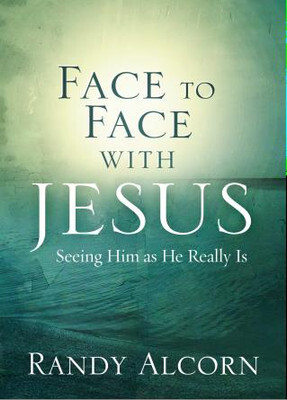 Face to Face with Jesus
Face to Face with Jesus 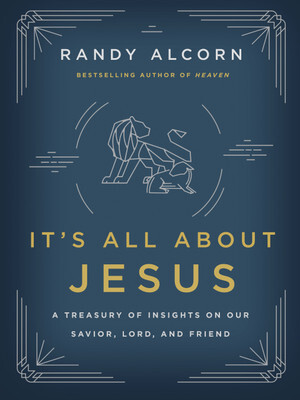 It's All About Jesus
It's All About Jesus
August 11, 2025
The Best Part of the New Earth Will Be Enjoying God’s Presence

The 1998 movie What Dreams May Come portrays Heaven as beautiful but lonely, because a man’s wife isn’t there. Remarkably, someone else is entirely absent from the movie’s depiction of Heaven: God.
That movie’s viewpoint mirrors numerous contemporary approaches to Heaven which either leave God out or put Him in a secondary role.
The Five People You Meet in Heaven, a best-selling novel by Mitch Albom, portrays a man who feels lonely and unimportant. He dies, goes to Heaven, and meets five people who tell him his life really mattered. He discovers forgiveness and acceptance, all without God and without Christ as the object of saving faith.
Five People portrays a Heaven that isn’t about God and our relationship with Him, but only about human beings and our relationships with each other. A Heaven where humanity is the cosmic center, and God plays a supporting role. The Bible knows nothing of this pseudo-Heaven.
Numerous people claim to have gone to Heaven and seen loved ones and also Jesus, yet almost never do they react as the “beloved disciple,” the apostle John, did: “When I saw him, I fell at his feet as though dead” (Revelation 1:17).
Surely no one who had actually been in Heaven would neglect to mention what Scripture shows is its main focus. If you had spent an evening dining with a king, you wouldn’t just talk about the place settings! When John was shown Heaven and wrote about it, he recorded the details—but first and foremost, from beginning to end, he kept talking about Jesus, the Lion and the Lamb, with infinite gravitas and beauty.
A Honeymoon without a Groom?
Jesus promised his disciples, “I will come back and take you to be with me that you also may be where I am” (John 14:3). For Christians, to die is to “be present with the Lord” (2 Corinthians 5:8, NKJV). The apostle Paul says, “I desire to depart and be with Christ, which is better by far” (Philippians 1:23). He could have said, “I desire to depart and be in Heaven,” but he didn’t—his mind was on being with Jesus.
Heaven without God would be like a honeymoon without a groom or a palace without a king. Teresa of Avila said, “Wherever God is, there is Heaven.” The corollary: Wherever God is not, there is Hell.
The presence of God is the essence of Heaven. John Milton put it, “Thy presence makes our Paradise, and where Thou art is Heaven.” Heaven will be a physical extension of God’s goodness.
Samuel Rutherford said, “O my Lord Jesus Christ, if I could be in heaven without thee, it would be a hell; and if I could be in hell, and have thee still, it would be a heaven to me, for thou art all the heaven I want.” To be with God—to know Him, to see Him—is the central, irreducible draw of Heaven.
Heaven’s Greatest Miracle
The best part of Heaven on the New Earth will be enjoying God’s presence. He’ll actually dwell among us (Revelation 21:3-4). Just as the Holy of Holies contained the dazzling presence of God in ancient Israel, so will the New Jerusalem contain His presence. The New Earth’s greatest miracle will be our continual, unimpeded access to the God of everlasting splendor and perpetual delight.
What is the essence of eternal life? “That they may know you, the only true God, and Jesus Christ, whom you have sent” (John 17:3). The best part of Heaven will be knowing and enjoying God.
Sam Storms writes, “We will constantly be more amazed with God, more in love with God, and thus ever more relishing His presence and our relationship with Him. Our experience of God will never reach its consummation. …It will deepen and develop, intensify and amplify, unfold and increase, broaden and balloon.”
The Reservoir that Will Never Run Dry
Because He is beautiful beyond measure, if we knew nothing more than that Heaven was God’s dwelling place, it would be more than enough to make us long to be there.
Of course we will enjoy all the secondary gifts God gives us, but they will be derivative of God Himself, and our happiness in them will be happiness in him. Jonathan Edwards said, “The redeemed will indeed enjoy other things…but that which they shall enjoy in the angels, or each other, or in anything else whatsoever, that will yield them delight and happiness, will be what will be seen of God in them.”
“They feast on the abundance of your house; you give them drink from your river of delights. For with you is the fountain of life” (Psalm 36:8-9). This passage portrays the joy that God’s creatures find in feasting on Heaven’s abundance, and drinking deeply of His delights. Notice that this river of delights flows from and is completely dependent on its source: God. He alone is the fountain of life, and without Him there could be neither life nor abundance and delights.
The Ultimate Wonder
We may imagine we want a thousand different things, but God is the one we really long for. “O God, you are my God, earnestly I seek you; my soul thirsts for you, my body longs for you, in a dry and weary land where there is no water” (Psalm 63:1). God’s presence brings satisfaction; His absence brings thirst and longing.
Our longing for Heaven is a longing for God—a longing that involves not only our inner beings, but also our bodies. Being with God is the heart and soul of Heaven. Every other heavenly pleasure will derive from and be secondary to His presence.
All our explorations and adventures and projects in the eternal Heaven—and I believe there will be many—will pale in comparison to the wonder of being with God and entering into His happiness. Yet everything else we do will help us to know and worship God better.
God’s greatest gift to us is now, and always will be, nothing less than Himself.
Recommended Reading
 Everything You Always Wanted to Know About Heaven
Everything You Always Wanted to Know About Heaven 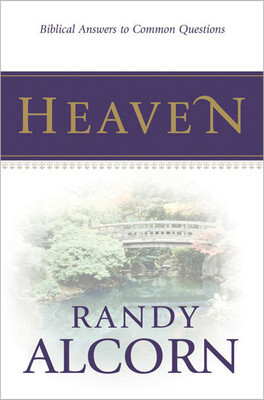 Heaven Booklet (20-Pack)
Heaven Booklet (20-Pack)  The Promise of the New Earth
The Promise of the New Earth



